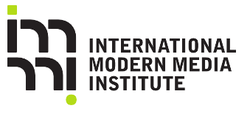International Modern Media Institute
The International Modern Media Institute (IMMI) is an international institution with the aim of promoting debate about laws good for freedom of information, speech, and expression. The institute does this by offering advice and guidance in relation to legislation.[1]
 | |
| Formation | 2011 |
|---|---|
History
On 18 February 2010, the institute entered a parliamentary resolution proposal, commonly known as the Icelandic Modern Media Initiative, into the Icelandic Parliament Alþingi,[2][3] proposing that Iceland "strongly position itself legally with regard to the protection of freedoms of expression and information".[4] The proposal was adopted unanimously by parliament on 16 June 2010.[5] Birgitta Jónsdóttir from The Movement was the chief sponsor of the proposal, 19 other MPs (out of 63) from all parties in the parliament supported the proposal by co-sponsoring it.
The proposal passed on 16 June was not a piece of final legislation. Instead, it began a process of editing 13 separate laws according to the proposal's specifications. This process was expected to be completed by mid-2012.[6][7]
After WikiLeaks exposed the loan book of Kaupthing Bank, one of the largest news channels, RUV, was injuncted from displaying the news story. Instead they were forced to simply put a message up of the WikiLeaks website. This led to WikiLeaks being invited by the Digital Freedoms Society to attend an annual conference in Iceland.[8][9][10][11]
The IMMI board has released a report of the legislation on April 16, 2012.[12] It details the status of various proposals that make up IMMI and their progress.
Support and endorsements
The IMMI project was cooperatively organised by numerous organisations and members of the Icelandic parliament.[13] Its principal endorsers were Eva Joly, Index on Censorship, the Icelandic Digital Freedom Society, WikiLeaks, and Icelandic MPs such as Birgitta Jónsdóttir and Róbert Marshall. The project has also had public endorsements from various organisations such as Global Voices, La Quadrature du Net and the Free Knowledge Institute.[14]
References
- "About IMMI". en.immi.is. Retrieved 2017-01-24.
- "Alþingi.is: Þskj. 688. Þingsályktunartillaga um að Ísland skapi sér afgerandi lagalega sérstöðu varðandi vernd tjáningar- og upplýsingafrelsis" (in Icelandic). Althingi.is. Retrieved 2013-12-22.
- Hirsch, Afua (2010-07-12). "Iceland aims to become a legal safe haven for journalists". The Guardian. ISSN 0261-3077. Retrieved 2017-09-25.
- "IMMI Resolution". en.immi.is. Retrieved 2017-01-24.
- Stray, Jonathan (16 June 2010). "What will Iceland's new media laws mean for journalists?". Nieman Journalism Lab. Retrieved 17 June 2010.
- "ICELAND TO BECOME INTERNATIONAL TRANSPARENCY HAVEN". Retrieved 3 April 2011.
- Chu, Henry (2 April 2011). "Iceland seeks to become sanctuary for free speech". Los Angeles Times. Retrieved 3 April 2011.
- "WIKILEAKS - - List of claims lodged against Kaupthing Bank hf, January 23, 2010" (PDF). Archived from the original (PDF) on January 28, 2012. Retrieved 2014-02-28.
- "Meet The New Public Face Of WikiLeaks: Kristinn Hrafnsson - Forbes". Blogs.forbes.com. Retrieved 2014-02-28.
- Archived June 27, 2011, at the Wayback Machine
- Vallance, Chris (12 February 2010). "Iceland to be 'journalism haven'". BBC News.
- Archived May 1, 2012, at the Wayback Machine
- "Iceland to become 'haven' for reporters". Archived from the original on February 21, 2010. Retrieved February 20, 2010.
- "Icelandic Modern Media Initiative: Endorsements". Immi.is. Retrieved 2013-12-22.
As of this edit, this article uses content from "International Modern Media Institute - Frequently Asked Questions", which is licensed in a way that permits reuse under the Creative Commons Attribution-ShareAlike 3.0 Unported License, but not under the GFDL. All relevant terms must be followed.
External links
- International Modern Media Institute
- International Journal of Communication (November 2012): Beyond Wikileaks: The Icelandic Modern Media Initiative and the Creation of Free Speech Havens
- Harvard Nieman Journalism Lab: Iceland aims to become an offshore haven for journalists and leakers
- The Guardian: WikiLeaks editor: Why I'm excited about Iceland's plans for journalism
- BBC News: Iceland's journalism freedom dream prompted by Wikileaks
- IDG: Icelanders hope to host controversial data from around world
- Huffington Post: Iceland Aims To Become Offshore Haven For Journalists
- Freedom House: Iceland Law to Provide Unprecedented Protections for Journalists
- AFP: Iceland safe haven for press freedom: Wikileaks insider
- The Independent: Iceland rewrites law to create haven for investigative reporting
- Thomas Hoeren, IMMI - the EU perspective, text published in Computer und Recht International 2010 (englisch)